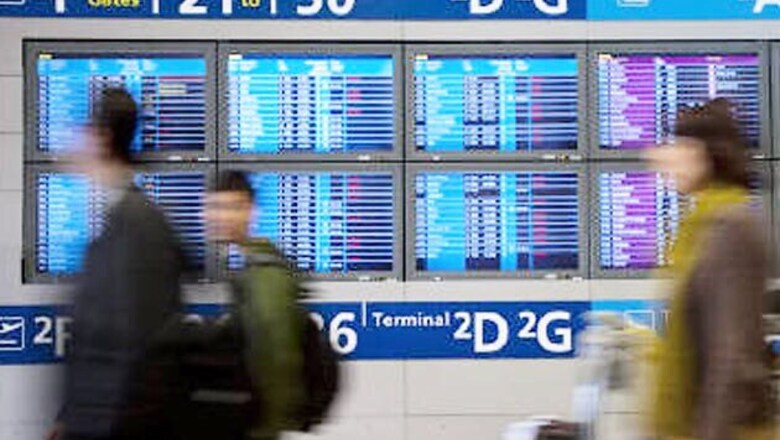
views
London: European airports started to return to life on Tuesday after five days cut off from the rest of the world by a volcanic ash cloud, as authorities downgraded the risk the ash posed to aircraft. Britain, a major global air hub as well as a busy destination in its own right that has been squarely under the ash plume, said it would reopen all its airspace within hours, giving a huge boost to travellers and air freight.
The progressive reopening offered stranded passengers relief after days of frustration since no-fly zones were imposed on Thursday. Belgian businessman Thomas Vanderstappen was playing airline roulette, buying five refundable air tickets from Moscow to different European destinations in the hope one flight would eventually take off.
"I should get out today, Vienna seems a sure thing," he said at Moscow's Domodedovo airport, which had seen a significant increase in flights to Western Europe in the previous 24 hours.
"The first two days I spent a lot of time in the airport I was checked in four or five times on four or five different airlines. I even got onto planes and then got kicked off."
European aviation control agency Eurocontrol said on Tuesday about half of scheduled air traffic in Europe was expected to operate: about 14,000 flights, up from a third on Monday.
Britain had lagged its European neighbours in downgrading the threat to airplanes from the ash, which can potentially scour and even paralyse jet engines.
A British Airways jet lost power in all four engines after flying through an ash cloud above the Indian Ocean in 1982.
Britain's Civil Aviation Authority made clear that scientists and manufacturers had now downgraded the risk from flying in areas of relatively low ash concentrations.
"This evidence-based approach helped to validate a new standard that is now being adopted across Europe," it said. "The major barrier to resuming flight has been understanding tolerance levels of aircraft to ash.
Manufacturers have now agreed increased tolerance levels in low ash density areas." The European Union had agreed a regime for easing flight restrictions on Monday under pressure from airlines losing $250 million a day -- many of which had flown test flights without sustaining any damage.
Air France said it planned to fly all of its long-haul programme on Wednesday, although flights in parts of northern Europe would remain suspended. Germany, with the major Frankfurt hub, kept its airspace closed, with some exceptions.
It is not clear how long it will take to clear a backlog of hundreds of thousands of stranded travellers Earlier in the day, Britain had despatched a warship to northern Spain to collect around 300 stranded Britons.
It said it would use Madrid as a hub for British citizens stranded outside of Europe to fly to, and that more than 100 coaches were being sent to take them to ferry ports.
ECONOMIC IMPACT
"We know there are still a lot of problems for passengers on the ground," Helen Kearns, spokeswoman for the executive European Commission, told a briefing. "We are faced with an unprecedented crisis. The disruption will continue over the week."
The economic impact of the cloud, already hitting parts of the supply chain, could increase sharply if air travel is disrupted into a second week -- potentially denting the fragile recovery from the global recession.
PricewaterhouseCoopers estimated a week of disruption could destroy around 0.025-0.05 per cent of annual British GDP, and the same would probably be true of other European countries.
Luxury carmaker BMW said it was stopping production at some German plants due to a lack of electronic component deliveries. Nissan Motor Co is halting production on three lines in Japan.
The Association of European Airlines said some European airlines would be out of business in the next week or two if the disruption continued. A spokesman for the International Air Transport Association said: "We need to find a better way for decision-making."
Humanitarian flights were also affected. The US military is evacuating war-wounded from Afghanistan to a base in Iraq, instead of sending them to Germany.
A polio immunisation campaign in West Africa has had to be delayed because the vaccines are stuck at French and German airports. "These vaccines have to be kept cool and, if this situation lasts longer, they would have to be sent back to manufacturers to ensure that they are preserved, " Martin Dawes, of the UN Children's Fund UNICEF, told Reuters.
WEATHER PATTERNS
On Tuesday, the ash spewing from the erupting volcano was hanging lower in the air, which was seen as better news for Europe, but strong winds higher up made conditions uncertain. Rognvaldur Olafsson, chief inspector at the Icelandic department of civil protection, told Reuters: "We have some indications that the activity is decreasing.
We have less ash fall, and also there seems to be a little less activity in the crater... "You have to choose your words very carefully, but at least the scientists tell us that the activity is going down. We cannot make the assumption that the worst is over, but we hope it is."
An expert from the World Meteorological Organisation said in Geneva that a low pressure weather system moving into Iceland should help clear the ash cloud within days. "From a meteorological point of view, (for) the second part of the week towards the weekend, all indications are very, very positive," the WMO's Herbert Puempel told journalists.




















Comments
0 comment